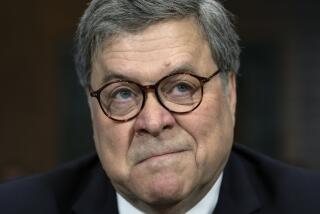Bell to Report Hutton Lacked Controls
NEW YORK â E. F. Huttonâs top officials bear responsibility for not having installed controls that could have uncovered or prevented illegal overdrafting by the brokerage firm, the Wall Street Journal quoted the head of an internal investigation as saying.
But the executives, including former Hutton President George Ball, were not directly responsible for the scheme, according to Griffin Bell, a former U.S. attorney general who is heading the internal investigation of the overdrafting, the Journal said Thursday.
However, Bell issued a statement calling the Journalâs report inaccurate and premature. He said the Journal broke an embargo agreement he had reached with the reporter from the newspaper.
âI am still interviewing a number of individuals and forming my judgments and conclusions, a fact of which the Wall Street Journal was well aware and did not reflect in the article,â Bell said.
Asked for comment, Stewart Pinkerton, deputy managing editor of the Journal, said: âWe think our reporting on this matter speaks for itself.â He maintained that the story was accurate.
The article said the newspaper had agreed to withhold the comments pending the release of Bellâs report but broke the embargo because of a story published by another newspaper Wednesday that carried a brief outline of Bellâs findings.
Hutton pleaded guilty on May 2 to 2,000 counts of mail and wire fraud in connection with the scheme. It also paid $2.75 million in fines and legal costs as part of its settlement with the Justice Department. No individual Hutton officials were named in the plea.
Steve Nelson, a spokesman for Hutton, said Bell âhas not completed his inquiry. We believe it is not appropriate to comment on selective reports on it in the news media. We will comment on it in detail when we receive the final report.â
The scheme was âthought of at a lower level,â Bell told the Journal, âbut there is considerable responsibility on high for not having the systems to detect the overdrafting.â
Bell told the Journal that any direct management responsibility for failing to detect the scheme did not go higher than Thomas Morley, a senior vice president in charge of the companyâs cash management activities. Morley âfailed in his dutyâ by not detecting the illegal overdrafting, Bell said.
More to Read
Inside the business of entertainment
The Wide Shot brings you news, analysis and insights on everything from streaming wars to production â and what it all means for the future.
You may occasionally receive promotional content from the Los Angeles Times.








